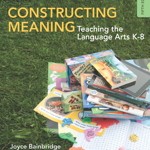On Thursday, March 1, 2012, from 10:30am – 12:00pm, international scholars Dr. Rodney Hopson and Dr. Christine Sleeter visited Western to discuss equity in education. In April 2009, Ontario’s Equity and Inclusive Education Strategy was launched to help the education community identify discriminatory biases, remove systematic barriers, and support the achievements and well being of students.
I have just come from this discussion and presentation and am reviewing the snippets of information I tweeted during the talk (#westerneducation). This reflection is of course, my attempt to do what Sleeter asks of us; to consider the context so that we can translate this in to our teaching.
The goals (to develop programs that embody multiculturalism and social justice) are goals that few teachers would disagree with. So what are the barriers? I worry that a focus on scorable and comparable ‘accountability mechanisms’ has moved us so far away from those we serve (our students) in service of systems — that we end up serving only systems. How do you remove systemic barriers if system needs are a big part of the problem? Systemic processes have included a move to the standardized curriculum and the requisite checks and balances in the form of standardized assessment. Perhaps it is time to redress the balance in what is valued and therefore served?
We say that we want to serve students, and we want to engage students. If we want teachers to create engaging spaces for all students to learn – then the teachers themselves need to be engaged. We cannot shackle teachers to one form of ‘engagement’ in their professional communities, and expect them to create something completely different for their students. Christine spoke this morning of preparing to deliver a lecture, and, seeing her students’ eyes glaze over, she stopped and asked them what they were interested in learning about. Rather than ‘covering’ the feudal system as prescribed and planned, they entered into an exploration of feminism and women’s liberation (a hot topic of the time).
Engagement, as Rodney Hopson reminds us, stems from the issues and the concerns relevant to our students’ (and I would argue, our teachers’) lives. He and Christine both described the importance of modeling the change that they wanted to create. By creating democratic learning environments for their students, they freed their students up to re-create those spaces in their practice and in their communities. We need to go beyond thinking about this at Faculties of Education though. Part of our community (as we discussed this morning) includes the Ministry of Education, the boards we work for and with, our school administration and our colleagues. We must think about reframing the ways in which we work in all of our communities – those we participate in, as well as those we serve.
Rodney and Christine described the contexts within which they work, and how they have been able to rethink the relationships between universities and communities that work together to prepare citizenry for democratic engagement. Rodney suggested that there is guidance in the communities within which we work and teach; there are indigenous ways of thinking in community that will allow us to engage respectfully.
I am reminded of a colleague who is the principal of a school that ‘ranks’ poorly on the standardized tests in our province. Those who are ‘in community’ with their students, know well that children from impoverished communities will not always do well on the kinds of information valued by tests. My colleague is liberated by their low ranking; (the ‘formula for success’ fed to all isn’t working). Rather, she has been creative in her efforts to to work differently with her teachers and her community in order to both honour and address their needs. As Christine Sleeter emphasized, ‘when curriculum, pedagogy and teachers are culturally relevant to kids, they improve’.
I have suggested in a recent chapter (see below) that ‘At Risk’ students need ‘risk taking teachers’. I know that there are ‘risk taking’ teachers with the courage to ‘speak back’ to policies that do not serve their students; mandates that do not respect their contexts. I see these people all the time, freely engaged in discussions in the virtual learning networks. We need to have these conversations in our ‘home’ communities too.
As I was composing these quick thoughts, I received a response from one of the people in my twitter community -Zoe Branigan-Pipe

@zbpipe
(@zbpipe)- an awesome teacher who lives what we are talking about. Take a look at a blog that she wrote that describes how she re-imagined the borders and boundaries and what she could do about it: http://pipedreams-education.ca/2011/02/01/educon-changed-my-monday-morning-lesson/
View a video recording of this talk here: ” title=”Sleeter and Hopson”>Sleeter and Hopson
Hibbert, K. Barker, D. & Ludwig, T. (in press). How must our approach to teaching Adolescent Literature change in order to engage the complex needs of at risk students? In K. James, T. Dobson & C. Leggo (eds). English In Middle and Secondary Classrooms. Creative and Critical Advice from Canadian Teacher Educators. Nelson Education
 on Monday, March 26, 2012. Her talk, titled: Contemporary Issues in Multiliteracies: Interactivity, Connectivity, and Mobility will take place from 1:00 – 3:30 in the Faculty of Education’s Community Room. We will open the room up for dialogue following this discussion and we are hoping to stimulate some interesting ideas around how our thinking about literacy is changing and what this means to our future practice.
on Monday, March 26, 2012. Her talk, titled: Contemporary Issues in Multiliteracies: Interactivity, Connectivity, and Mobility will take place from 1:00 – 3:30 in the Faculty of Education’s Community Room. We will open the room up for dialogue following this discussion and we are hoping to stimulate some interesting ideas around how our thinking about literacy is changing and what this means to our future practice.

